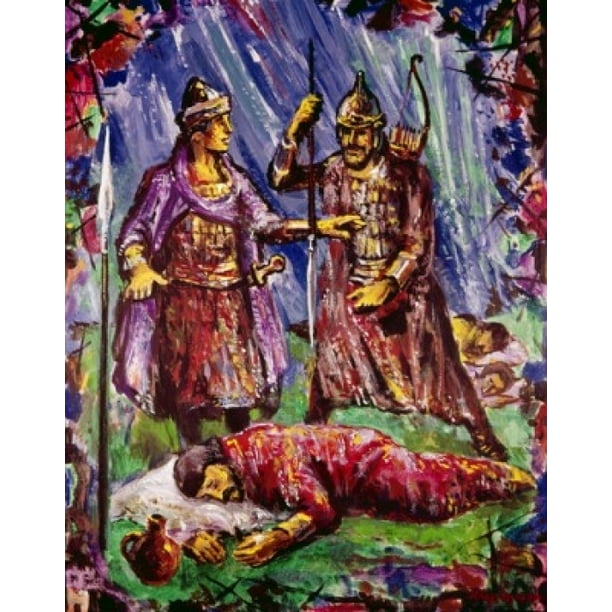
7th Sunday in Ordinary Time C
Readings: 1 Samuel 26:2, 7-9, 12-13, 2-23 1 Corinthians 15:45‑49 Luke 6:27‑38
No ethical teaching is more characteristic of Jesus than the command, "Love your enemies, do good to those who hate you . . ." (Lk 6:27). But nothing seems to violate our natural instinct to self-preservation, if not retaliation, than the saying, "When someone slaps you on the cheek, turn and give him the other" (Lk 6:29). Only with the guidance of the compassionate Father revealed to us by Jesus do we dare to walk on this most unworldly path. "The Lord is kind and merciful." Let the refrain for this Sunday's psalm (Ps 113) remind us of the Father's compassion for us sinners and even for our enemies.
The Old Testament reading from Samuel recounts David's sparing of King Saul who has repeatedly attempted to kill him (see 1 Samuel 18‑23). Although David's harp playing and warrior prowess are Saul's only hopes for sanity and victory over the Philistines, the king's mad jealousy has driven David from court and forced him to live as a virtual outlaw in the wilderness. Despite having every human reason for taking vengeance against Saul, David refuses to kill the Lord's anointed king. In fact this is the second time that David has had Saul within his grasp (see 1 Samuel 24). Each time David's men urge him to take his vengeance upon the king. In today's reading, Abishai whispers to David, “God has delivered your enemy into your grasp this day. Let me nail him to the ground with one thrust of the spear; I will not need a second thrust!” But David refuses and says, “Do not harm him, for who can lay hands on the Lord's anointed and remain unpunished?” Instead of taking vengeance, David removes Saul's sword and water jug which he later uses to remind the king of his magnanimity. “Here is the king's spear. . . The Lord will reward each man for his justice and faithfulness. Today, though the Lord delivered you into my grasp, I would not harm the Lord's anointed.”
In the Epistle reading Paul continues his defense of the resurrection to the Corinthians. One of the problems they had was visualizing the manner of the resurrection of the dead and the nature of resurrected bodies. In the section preceding our reading, Paul uses a metaphor drawn from the planting of seeds to describe the miraculous transformation of our bodies at the resurrection. “What you sow does not come to life unless it dies. And what you sow is not the body which is to be, but a bare kernel . . . So is it with the resurrection of the dead. What is sown is perishable, what is raised is imperishable” (1 Cor 15:36‑42). In our reading Paul makes the same argument using an antithetical contrast between the first man, Adam, who was natural and earthly, and Christ, the second Adam, who was spiritual and heavenly. He concludes with the assertion, "Just as we resemble the man from earth, so shall we bear the likeness of the man from heaven" (1 Cor 15:49).
This Sunday's Gospel continues Jesus' sermon on the plain in Luke by amplifying the meaning of the blessings and curses which we heard in last week's gospel. Jesus' commands are addressed to would be disciples, “To you who hear I say . . .” The first set instructs the disciples in the way to respond to the persecution and hatred envisioned in the beatitude, “Blessed are you when people hate you . . .” (Lk 6:22). Jesus commands his persecuted followers to love and even bless and pray for their enemies (Lk 6:27‑29). In the second set of commands, Jesus is challenging the rich and comfortable (6:24‑26) to use their wealth generously, even to the point of sharing with their enemies. “If you lend money to those from whom you expect repayment, what credit is that to you? . . . love your enemies and do good to them, and lend expecting nothing back” (Lk 6:34‑35).
Jesus concludes these radical teachings by giving the basis for his whole ethic. His disciples are called to be “children of the Most High” by living out the merciful love of God, “for He Himself is kind to the ungrateful and wicked. Be merciful, just as your Father is merciful” (6:35‑36).
No comments:
Post a Comment